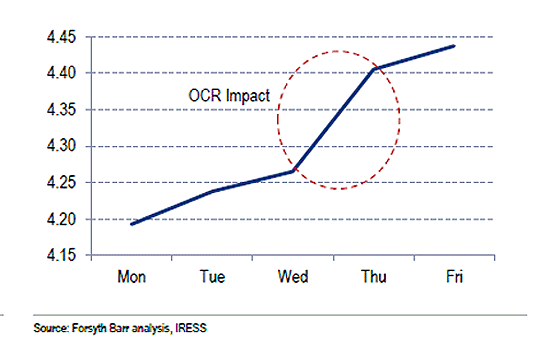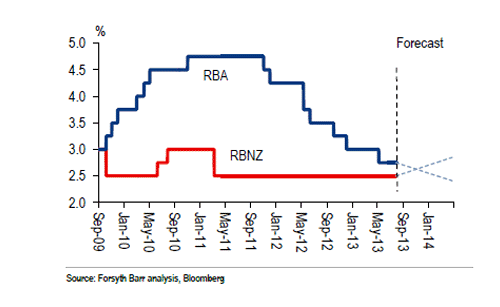
Content supplied by Forsyth Barr
The following is a summary of the key events impacting fixed income markets over the past week.
Last week saw the Reserve Bank of New Zealand release its review of the Official Cash Rate (OCR) and this week we have announcements from the Fed, the European Central Bank (ECB) and the Bank of England (BoE).
There is little doubt the Feds commentary will be well and truly dissected.
RBNZ send wholesale interest rates higher
Many expected the OCR review to be similar to recent rhetoric from the RBNZ, however the 307 word release sent swap rates higher and future pricing of an OCR hike all but confirmed for March 2014.
The outcome of the hawkish comments has led the market to now fully price in a +25bp OCR hike for the 13 March 2014 RBNZ meeting. There is also an ~80% chance of a +25bp hike occurring in the first RBNZ meeting in January 2014.
There are a number of central bank meetings this week, however none are expected to be as hawkish as the RBNZ. Governor Wheeler’s comments in the OCR release saw interest rates and the New Zealand Dollar higher.
Although the RBNZ impacts the short-end of the curve, the yield curve did steepen (10-year less 2-year) by +4bp to 133bp over the week. However, as the RBNZ move from rhetoric to action, we would expect the yield curve to flatten over time.
OCR review stirs things up
The market looks like it is on the money. Well, so much for the dull and predictable Official Cash Rate (OCR) Review.
The Reserve Bank of New Zealand (RBNZ) Governor, Graeme Wheeler, sent wholesale interest rates and the NZD higher with an unexpected hawkish statement.
For the first time in a long time the RBNZ has moved into a tightening bias, something we and the market have been forecasting for some time now.
While the RBNZ has tried to balance the cloudy offshore picture that includes the Fed and its stimulus, the debt crisis in Europe, and Australia, our closest trading partner, struggling, it will ultimately come back to local inflationary pressure back home.
The comment in the OCR review surrounding growth becoming more widespread, is a clear sign that despite inflation registering at 14-year lows recently, inflation (or future inflation) is becoming more of an issue for the RBNZ.
Let’s remember that back in its June Monetary Policy Statement the RBNZ forecast the OCR to rise sometime in the second half of 2014, whereas the majority of the market had been forecasting March 2014 for the first hike. This remains the case, although there is now more conviction in the March pricing and the real possibility of a rise at the January 2014 meeting.
Market reaction to the OCR review was pretty swift with the short-end of the curve, the one-year swap rising +6bp, however it was the long-end of the curve once again rising the most with a +13bp rise for the 10-year swap.
The chart below shows the reaction in the 5-yr swap rate around the OCR announcement.

One of the most concerning aspects regarding the signalling of a higher central bank rate is the inevitable rise of the currency. The RBNZ has managed quite successfully to talk the NZD lower, which has been matched by some timely interventions. However, with at least one, possibly two -25bp cuts expected to the Reserve Bank of Australia’s 2.75% cash rate, the NZD/AUD is now at its highest level since 2008.
The chart below shows the respective RBNZ and RBA overnight cash rates with their forecast future directions.

Offshore in no hurry
Previously the ECB and BoE have been quick to reiterate to the market that despite the Fed looking to remove or taper its stimulus, both the ECB and BoE remain ‘accommodative’. This stance is also likely to contribute to the attractiveness of New Zealand from both an interest rate and currency perspective.
It is one-year on from 23 words that changed the Euro debt crisis. It was 26 July 2012 when ECB boss Mario Draghi said "Within our mandate, the ECB is ready to do whatever it takes to preserve the euro. And believe me, it will be enough". These words changed the situation in Europe and with the Feds talk of ‘tapering’ now grabbing the headlines, Europe’s debt crisis appears to be yesterday’s news. Will it remain that way?
Credit Markets
Credit markets were wider last week with Australia +6bp wider. In New Zealand the yield on the ANZ Investment Grade Bond Index rose +21bp due to the expectations that interest rates will rise. The yield is now +79bp higher than its lows at the beginning of May.
As the New Zealand economy improves so does the credit spreads therefore limiting the impact on the nominal yields on bonds. Despite the underlying swap rate rising, credit spreads continue to contract and therefore we have not witnessed increasing yields on corporate bonds to the same extent as the rise in swap rates.
US Unemployment
The end of July brings the closely watched and highly anticipated US non-farm payrolls data. The Fed remain ‘data-driven’, therefore any significant move lower in the US unemployment rate will be negative for bonds as it will be a tick in the box for the Fed to wind back its stimulus.
Corporate / Credit news
Contact Energy (CEN) provided the market with its monthly operational update. CEN lost -4,000 electricity customers in the year to 30 June 2013 but did gain +3,500 LPG customers.
Fonterra (FCG) downgraded the market expectations for FY13 to below prospectus forecasts. The ~20% downgrade will mean an FY13 EBIT of ~NZ$1.0bn was due to “the unprecedented volatility caused by the extreme drought in New Zealand earlier this year, and the acceleration of the reshaping of Fonterra’s Australian business”.
Genesis Energy produced a solid Q4. Genesis increased its electricity customers by +3% while total generation fell -19% compared to the pcp due to an outage at the Tekapo A and B power stations. The warmer weather also impacted generation.
Mighty River Power (MRP) released its Q4 operating statistics which were slightly ahead of its prospectus forecasts. One encouraging aspect was the line losses were less than expected meaning MRP did not have to buy as much electricity as expected and hence this is positive for profitability.
The NZX released its half yearly operating metrics ended 30 June 2013. The lack of listed debt issuance was clear with a -61.6% decline in total debt raised versus a year earlier. Total debt transactions fell -17.2% with the value of those trades falling -5.8% to NZ$525m.
SkyCity Entertainment Group (SKC) welcomed the passing of the Gambling reform Act 2013 by the South Australian Parliament. The approval is key for SKY’s A$300m investment in the Adelaide Casino.
Tower Group (TWR) had its credit rating affirmed by A.M. Best company, however the outlook was lowered to negative (from Stable). TOWER Capital – the issuer of the retail bonds, TWC010 - is not rated.
TrustPower (TPW) announced its operating results for the first three months of its FY14 financial year. Electricity customer numbers fell -1.9% versus the pcp and total customer sales (GWh) fell -8.1% over the same period. TPW remains on track with its Snowtown Stage II project.
Vector (VCT) released its operational performance for the year ended 30 June 2013. VCT’s customer base remained stable with a +0.7% increase along with a significant increase in its smart meters, which rose +37% versus the pcp.
----------------------------------------------------
Disclosures and Disclaimers:
Disclosure: The comments in this publication are for general information purposes only. This publication is not intended to constitute investment advice under the Securities Markets Act 1988. If you wish to receive specific investment advice, please contact your Investment Advisor. Forsyth Barr Limited and its related companies (and their respective officers, agents and employees) may own or have an interest in securities or other products referred to in this publication, and may be directors or officers of, or provide investment banking services to, the issuer of those securities or products, and may receive fees for acting in any such capacity in relation to that issuer. Further, they may buy or sell securities as principal or agent, and as such may undertake transactions that are not consistent with any recommendations contained in this publication. Forsyth Barr Limited and its related companies (and their respective officers, agents and employees) confirms no inducement has been accepted from the researched/recommended entity, whether pecuniary or otherwise, in connection with making any recommendation contained in this publication or on our website.
Analyst Disclosure Statement: In preparing this publication the analyst(s) may or may not have a threshold interest in the securities mentioned in this publication. A threshold interest is defined as being a holder of more than $50,000 or 1% of the securities on issue, whichever is the lesser. In preparing this publication non-financial assistance may have been provided by the entity being researched. A disclosure statement is available on request and is free of charge.
Disclaimer: This publication has been prepared in good faith based on information obtained from sources believed to be reliable and accurate. However, that information has not been independently verified or investigated by Forsyth Barr Limited. Accordingly, Forsyth Barr Limited: (a) does not make any representation or warranty (express or implied) that the information is accurate, complete or current; and (b) excludes and disclaims (to the maximum extent permitted by law) any liability for any loss which may be incurred by any person as a result of that information being inaccurate or incomplete in any way or for any reason. The information, analyses and recommendations contained in this publication are confidential to the intended recipients and are statements of opinion only. They have been prepared for general information purposes and whilst every care has been taken in their preparation, no warranty or representation is given (express or implied) as to their accuracy or completeness. Nothing in this publication should be construed as a solicitation to buy or sell any security or other product, or to engage in or refrain from doing so or engaging in any other transaction. This publication should not be used as a substitute for specific advice. This publication is intended to provide general securities advice only, and has been prepared without taking account of your objectives, financial situation or needs, and therefore prior to acting on any information, analysis or recommendation contained in this publication, you should seek advice from your usual Investment Advisor. Forsyth Barr Limited and its related companies (and their respective officers, agents and employees) will not be liable for any loss whatsoever suffered by any person relying upon any such information, analysis or recommendation. This publication is not intended to be distributed or made available to any person in any jurisdiction where doing so would constitute a breach of any applicable laws or regulations.
We welcome your comments below. If you are not already registered, please register to comment
Remember we welcome robust, respectful and insightful debate. We don't welcome abusive or defamatory comments and will de-register those repeatedly making such comments. Our current comment policy is here.